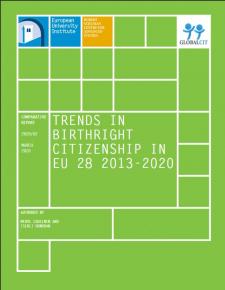
This report published by the European University Institute examines the development of birthright citizenship across the EU Member States during the 2013-2020 period. The study finds that most changes during this period made citizenship more inclusive, but with limited potential impact.
The authors look at birthright citizenship in its two forms: through descent from a citizen or through birth in the relevant state. In the latter category, the main legal changes in granting citizenship during the period included the creation of provisions for those who would otherwise be stateless and the extension of citizenship on the basis of continuing residence or education.
Recommendations of the report
- All Member States should provide citizenship for foundlings and stateless children.
- In the interest of encouraging immigrant integration, more general provisions should be made for children who are born in and will live in a state. Requirements about period of residence should not involve onerous requirements or procedures that exclude many people who have spent their entire lives in the state.
- The remaining countries without gender equality in transmitting citizenship to children outside marriage should amend this.
- States should accommodate different kinds of partnerships and parental relations in their citizenship laws.
Details
- Authors
- Merve Erdilmen, Iseult Honohan
- Geographic area
- EU Wide
- Contributor type
- Academics and experts
- Original source
- Posted by
Related content
2025 IMISCOE Spring Conference
The 2025 IMISCOE spring conference will take place on 17 – 19 March 2025 in Krems, Austria, and online. The title / topic of the conference is " The
Annual Nordic Conference on Integration
The 2024 Annual Nordic Conference on Integration will take place on 11 - 12 December. This year the event will examine how Nordic countries can make
Mental health of people with migration and refugee backgrounds in a changing Europe
The European Psyciatric Association (EPA) is organising a webinar on the complex mental health challenges faced by people with migration and refugee
Mental health support for displaced people, migrants and refugees
The Mental Health Support for Ukrainian Refugees (MESUR) project will hold its final webinar on 15 November. The webinar - organised by the Estonian
Cultural diversity – an obstacle or an opportunity in shaping a cohesive society?
The Estonian Integration Foundation, in collaboration with the country's Ministry of Culture, will host its 11th Integration Conference - entitled
